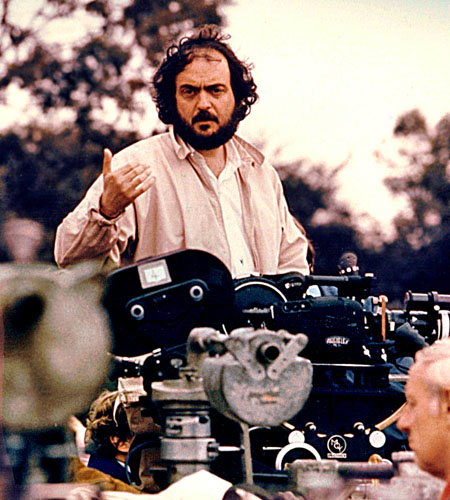Last month, just days before LACMA’s landmark exhibition, Stanley Kubrick, closed (it’d opened eight months before and, by all accounts, was consistently packed with Angelenos eager to pore over the early photographs for Look, the annotated screenplays, the set models and props, and so on), Robert Koehler argued at arts meme that the show was, in essence, “Kubrick’s Last Movie.” What production designer Patti Podesta, commissioned by LACMA to redesign the original the Deutsches Filmmuseum exhibition, had done was “‘co-direct,’ with Kubrick, a movie that’s not on a screen. Sure, there’s the requisite black box room showing a (digital) loop of extended clips from the filmography. But the heart of the show is a maze (quoting from The Shining) of rooms structured around themes, from Kubrick’s obsession with the color red to his conceptualization of human conflict as a chess game, to name just two. Kubrick, like Abel Gance and Sergei Eisenstein, believed in the structuring power of sequences, so each room in Podesta’s collaboration is a sequence illustrating ideas. Walking through this maze (I lost my direction more than once) creates a new kind of movie, the movie referencing itself, reminding you of the means in which movies are made while telling the story of an artist’s life.”
Kubrick’s life ended in 1999. We’ve been without him for so long, it’s a jolt to realize that, were he alive today, he’d be turning “only” 85. “Each month Stanley Kubrick isn’t making a film is a loss to everybody,” Sidney Lumet once said. I take the quote from a nice collection of brief appreciations from other filmmakers (Scorsese, Welles, Paul Thomas Anderson, and more) making the rounds on tumblr today. And whether or not he meant it as a birthday tribute, Jonathan Rosenbaum has just posted his 1991 essay on Spartacus (1960).
Tony Cannizzo’s video tour of the LACMA exhibition; see, too, parts 2 and 3
I could pick it up from there, patching together the swooniest passages from reviews of each of the films right on up through Eyes Wide Shut (1999). Instead, let me heartily recommend—and not for the first time—The Kubrick Series, a set of irresistibly engaging podcasts from Movie Geeks United (I’m linking to the main page, but you can find it easily on iTunes; you’ll want to download it to your glossy brick, since it adds up to several hours of listening). Every episode has its strengths, but, because Room 237 has been such a hit with the fans, I want to mention in particular the one on The Shining. The Geeks cover much of the same ground (plus way more), but do so more generously, albeit speculatively, of course—and without the smirk.
At the same time, because Barry Lyndon (1975) is my own favorite, I naturally could have done with another hour or so on it—but Bilge Ebiri‘s more than made up for that need to dwell on this masterpiece in his conversation with Peter Labuza. One more personal note. I can’t think of another filmmaker who elicits such varied reactions from me with each viewing of each film. There have been evenings when I absolutely despised A Clockwork Orange (1971), for example, and others that have had me agreeing with Buñuel (Orange was his favorite). 2001: A Space Odyssey (1968) has struck me at times as almost comically uneven, at others as one of the grandest achievements in all of cinema. One night, The Shining will leave me cold and disappointed, another, it won’t let me sleep. And so on. We can mourn a life cut short (at 70!), but, to my mind, the films Kubrick left us are inexhaustible.
Update: For Sight & Sound, Nick Wrigley has spoken with Kubrick’s “brother-in-law, confidant and regular executive producer,” Jan Harlan, in order to put together an extensively annotated list of Kubrick’s favorite films and viewing habits.
For news and tips throughout the day every day, follow @KeyframeDaily on Twitter and/or the RSS feed. Get Keyframe Daily in your inbox by signing in at fandor.com/daily.




